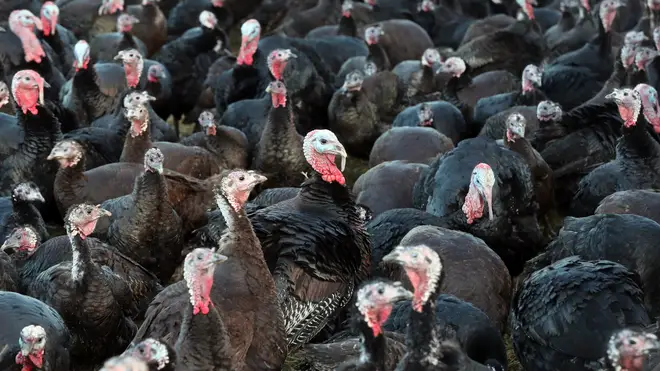
Henry Riley 10pm - 1am
29 November 2020, 10:59 | Updated: 29 November 2020, 14:17

Over 10,000 turkeys will be culled at a farm in North Yorkshire after an outbreak of bird flu has been confirmed.
pose a very low risk to people, and that properly cooked poultry products including eggs are safe to eat.
This follows several outbreaks across the UK in November, including at a Herefordshire chicken farm on November 11, and cases among geese and swans in regions including Gloucestershire, Devon, Dorset, and Co Londonderry in Northern Ireland.
Chief Veterinary Officer Christine Middlemiss, said: "Avian flu has been confirmed at a commercial turkey fattening farm near Northallerton, North Yorkshire.
"Immediate steps have been taken to limit the risk of the disease spreading and all the remaining turkeys at the farm will be culled.
"PHE has confirmed that the risk to public health is very low and the Food Standards Agency advises that bird flu poses a very low food safety risk for UK consumers.
"Bird keepers should remain alert for any signs of disease, report suspected disease immediately and ensure they are maintaining good biosecurity on their premises.
"We are urgently looking for any evidence of disease spread associated with this farm to control and eliminate it."
A detailed investigation is in progress to determine the most likely source of this outbreak, but Defra has said it does not anticipate any impact on the supplies of turkeys or other birds over Christmas.
Wild birds migrating from mainland Europe during the winter period can spread the disease to poultry and other captive birds.
As a result of outbreaks in the UK, new restrictions were declared nationwide to prevent the spread of the "highly infectious" flu earlier in November.
Dr Middlemiss said England, Scotland and Wales were now an Avian Influenza Prevention Zone (AIPZ), meaning bird keepers will have to legally follow strict new measures.
Under the new measures, keepers with more than 500 birds will need to restrict access for non-essential people on their sites.
Workers will need to change clothing and footwear before entering bird enclosures and site vehicles will need to be cleaned and disinfected regularly.
So-called backyard owners with smaller numbers of poultry including chickens, ducks and geese have also been urged to strengthen their biosecurity measures.